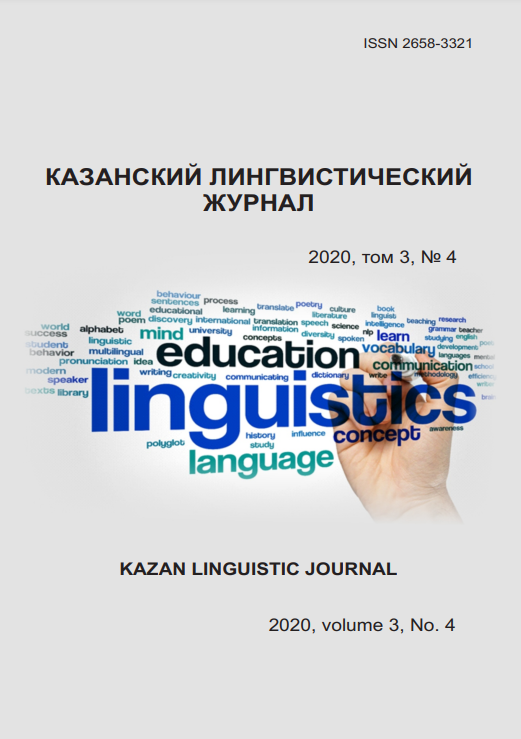Constitutional features of the academic discourse: digital transformation
Keywords:
discourse; academic discourse; institutional discourse; constitutive signs; chronotope; Information Technology; information and educational environment.Abstract
This article describes the constitutive features of academic discourse as one of the types of institutional discourse. The relevance of the topic is determined by the widespread use of academic discourse, its importance in the life of society and the need to consider this discourse taking into account the dynamically changing factors of human development, which make changes in its constitutive features, namely information technology. There are many interpretations of the term "discourse". This work is based on the understanding of discourse as a strictly oriented communicative interaction within the framework of a certain socioculture, which has a specific goal. Discourse is divided into two types: personality oriented and status oriented. Academic discourse as a type of institutional discourse has distinctive features: accuracy, objectivity, depersonification and terminology. The main constitutive features are the goal of communication, participants, chronotope, values and strategies, genres, precedent texts, discursive formulas. As a result of consideration of each feature, new characteristics were identified, the appearance of which was influenced by information technology. Information and educational environment, online classes, webinars and educational platforms are new concepts for academic discourse, which are more widespread and used every year.
References
Литература
Градостроительный кодекс РФ П. 13 ст. 1. 2020. // URL: https:// http://www.consultant.ru/document/cons_doc_LAW_51040 (дата обращения: 05.11.2020).
Зубкова Я.В. Ценности академического дискурса // Язык, коммуникация и социальная среда. Воронеж: ВГУ, 2009. Вып. 7. С. 135–14
Зубкова Я.В. Конститутивные признаки академического дискурса // Известия Волгоградского государственного педагогического университета. Волгоград: ВГПУ, 2009 г. Вып. 5. С. 28–32
Карасик В.И. О типах дискурса // Языковая личность: институциональный и персональный дискурс. Волгоград: Перемена, 2000. С. 5–20.
Карасик В.И. Языковой круг: личность, концепты, дискурс. Волгоград: Перемена, 2002. 477 с.
Макаров М.Л. Основы теории дискурса. Москва: ИТДГК «Гнозис», 2003. 280 с.
Тахтарова С.С. Коммуникативные категории в когнитивно–дискурсивной парадигме // Вестник Волгоградского государственного университета. Волгоград: 2017. Т. 16. № 2. С. 186–196
Хутыз И.П. Академический дискурс: культурноспецифическая система конструирования и трансляции знаний. Москва: Флинта, Наука, 2015. 176 с.
Хабермас Ю. Моральное сознание и коммуникативное действие. Спб: Наука, 2001. 382 с
Harris Z. Discourse analysis // Language. 1952. V. 28. № 1. P. 30.
References
Urban Development Code of the Russian Federation. P. 13, art. 1. (2020). // URL: https://http://www.consultant.ru/document/cons_doc_LAW_51040 (accessed: 05.11.2020). (In Russian)
Zubkova Ya.V. (2009). Values of Academic Discourse // Language, communication and social environment: scientific. Art. no. 7. Voronezh: VGU. Pp.135–142. (In Russian)
Zubkova Ya.V. (2009). Constitutive features of academic discourse // Izvestiya Volgogradskogo gosudarstvennogo pedagogicheskogo universiteta: nauch. st. vyp. 5. Volgograd: VGPU. Pp. 28–32. (In Russian)
Karasik V.I. (2000). About types of discourse// Linguistic Personality: Institutional and Personal Discourse. Volgograd: Peremena. Pp. 5–20. (In Russian)
Karasik V.I. (2002). Language circle: personality, concepts, discourse. Volgograd: Peremena. 477 p. (In Russian)
Makarov M.L. (2003). Basis of Discourse Theory. Moscow: ITDGK «Gnozis», 280 p. (In Russian)
Takhtarova S.S. (2017). Communicative categories in the cognitive–discursive paradigm // Vestnik Volgogradskogo gosudarstvennogo universiteta: nauch. st. T. 16. № 2, Volgograd: Pp. 186–196. (In Russian)
Khutyz I.P. (2015). Academic discourse: a culturally specific system for constructing and transmitting knowledge. Moscow: Flinta, Nauka, 176 p. (In Russian)
Khabermas Yu. (2001). Moral awareness and communicative action.Spb: Nauka. 382 p. (In Russian)
Harris Z. Discourse analysis // Language. 1952. V. 28. № 1. P. 30. (In English)






